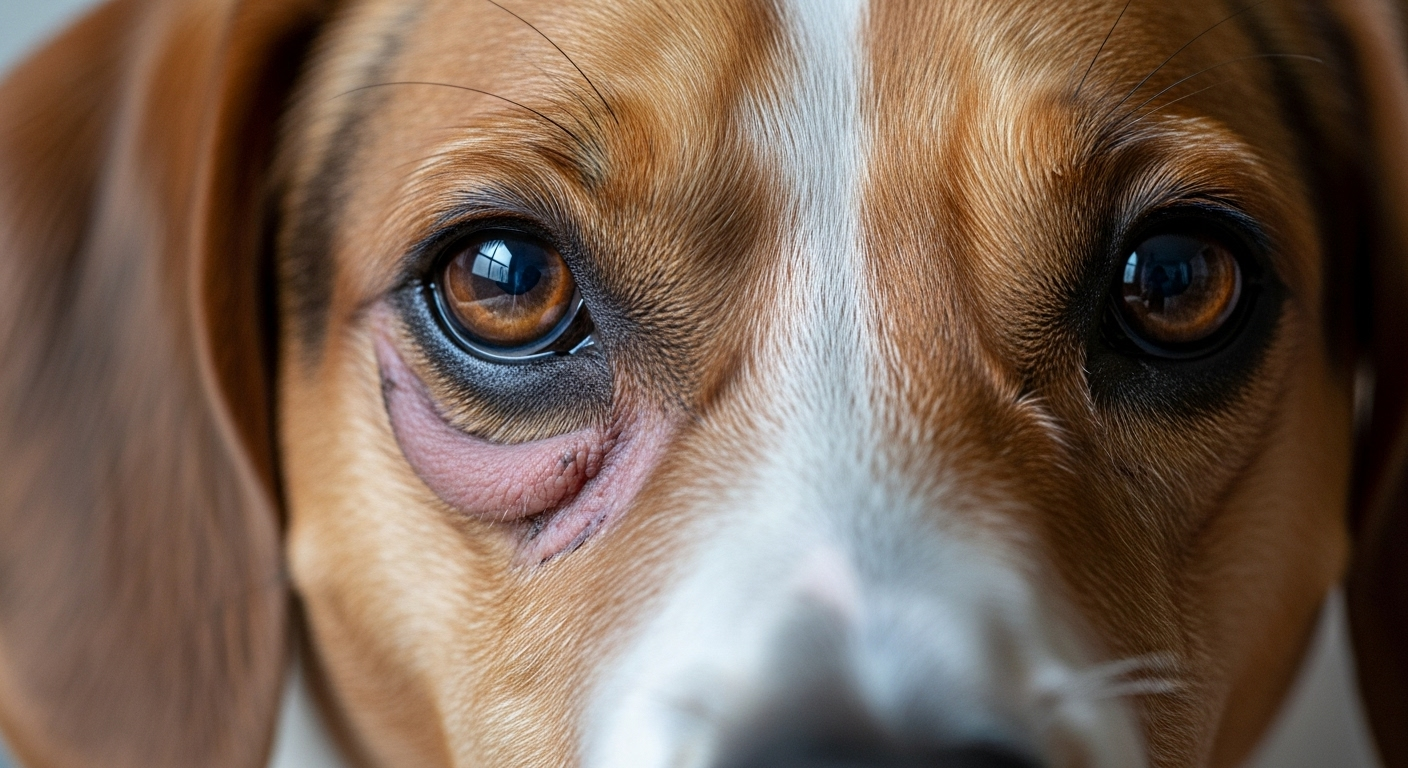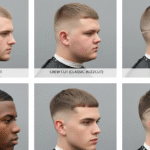Hair loss around your dog’s eyes can be alarming, and it’s important to identify the cause as soon as possible. If your dog is losing hair around their eyes, it could be due to various factors like allergies, infections, or even stress. In this article, we’ll explore the causes, symptoms, and effective treatments for Hair …
Hair loss around your dog’s eyes can be alarming, and it’s important to identify the cause as soon as possible. If your dog is losing hair around their eyes, it could be due to various factors like allergies, infections, or even stress.
In this article, we’ll explore the causes, symptoms, and effective treatments for Hair Loss Around My Dog Eyes, helping you restore their health and comfort. By the end, you’ll understand how to address this issue and provide the best care for your pet.

Why is My Dog Losing Hair Around Its Eyes?
If you’ve noticed your dog experiencing hair loss around their eyes, it’s essential to identify the root cause. Several factors contribute to hair loss in this area, and understanding them will help you address the issue effectively.
Allergies:
One of the most common causes of hair loss around the eyes is allergies. Dogs can be allergic to a variety of things, including certain foods, environmental allergens (like pollen or dust mites), or even grooming products. These allergies often cause itching and irritation, leading to hair loss, especially around the eyes, as dogs frequently scratch or rub the area.
Infections:
Bacterial, fungal, or parasitic infections can also lead to hair loss around your dog’s eyes. Infections like pyoderma (a bacterial infection of the skin) or yeast infections can cause inflammation and hair thinning. Additionally, parasites such as fleas or mites can cause itching and hair loss around the eye area.
Parasites:
External parasites, including fleas, ticks, and mites, are often to blame for hair loss. Flea infestations can result in intense itching and scratching, leading to hair thinning, especially around the eyes. Mites like Demodex can also cause hair loss due to their tendency to burrow into the skin.
Hormonal Imbalances:
Certain hormonal conditions, such as hypothyroidism or Cushing’s disease, can lead to thinning hair and skin issues. Hormonal imbalances often affect the skin and fur, resulting in hair loss around the eyes or other parts of the body.
Aging:
As dogs age, it’s natural for their fur to thin, especially around sensitive areas like the eyes. This is typically a gradual process and not necessarily a cause for concern unless accompanied by other health issues.
Symptoms of Hair Loss Around My Dog’s Eyes: How to Identify the Condition
The symptoms associated with hair loss around your dog’s eyes can vary depending on the cause. Here are some of the key signs that might indicate a health issue:
Itching and Scratching:
Dogs with allergies or infections around the eyes often scratch or rub the area. This may be accompanied by redness, swelling, or irritation around the eyes.
Redness or Swelling:
Infections or inflammation from allergies often cause the skin around the eyes to become red or swollen. This can also be a sign of a bacterial or fungal infection.
Hair Loss in Patches:
You may notice localized hair loss in small patches around the eyes. This can be due to parasites, infections, or even scratching caused by allergies.
Excessive Tearing:
Dogs with hair loss around their eyes often experience excessive tearing. The constant moisture can irritate the fur and skin, leading to further hair loss.
Scaly or Flaky Skin:
If your dog’s skin around the eyes becomes dry, flaky, or scaly, it could indicate a fungal or bacterial infection. This can also lead to thinning hair in the affected area.
Diagnosing Hair Loss Around a Dog’s Eyes: When to See a Vet?
If your dog is losing hair around their eyes, it’s important to get a professional diagnosis to determine the exact cause and treat it effectively. Here’s how a veterinarian might diagnose the condition:
Physical Examination:
Your vet will start by performing a physical examination of the affected area. They will look for signs of irritation, swelling, or discharge around the eyes.
Skin Scraping or Culture:
In case of suspected infection, the vet may perform a skin scraping to identify any bacteria, fungi, or parasites present. A culture may be taken to determine the best course of treatment.
Blood Tests:
If hormonal issues like hypothyroidism or Cushing’s disease are suspected, your vet may recommend blood tests to assess your dog’s thyroid levels or overall hormone balance.
Allergy Testing:
If your dog is suspected to have allergies, the vet may recommend allergy testing to pinpoint the exact allergens responsible for the symptoms.
Treatment Options for Hair Loss Around My Dog Eyes

Once the cause of hair loss around your dog’s eyes is identified, there are several treatment options available to address the issue:
Topical Treatments:
If the hair loss is due to an infection, your vet may recommend medicated creams, shampoos, or ointments to treat the infection and soothe the skin. Antibacterial or antifungal treatments are commonly used for skin infections around the eyes.
Oral Medications:
In more severe cases, your veterinarian may prescribe oral antibiotics, antifungals, or other medications to treat more severe infections or underlying health conditions. If hormonal imbalances are present, hormone-regulating medications may be necessary.
Allergy Management:
If allergies are the cause of the hair loss, your vet may recommend dietary changes, antihistamines, or allergy shots to manage your dog’s reactions. Identifying and avoiding the allergen is also crucial in managing the condition.
Parasite Treatment:
If external parasites such as fleas or mites are responsible for the hair loss, your vet will recommend a suitable treatment plan, which may include flea preventatives, mite treatments, or other parasite control products.
Dietary Supplements:
Omega fatty acids, biotin, and other nutritional supplements can help promote healthier skin and fur, potentially aiding in the regrowth of hair around the eyes.
Preventing Hair Loss Around Your Dog’s Eyes: Tips for Healthy Fur

Prevention is always better than cure, and adopting the right habits can help keep your dog’s eyes and fur healthy. Here are some preventive measures:
- Regular Grooming:
Maintain a grooming routine that includes regular brushing to remove dirt, debris, and prevent matting, which can irritate the skin. Use a gentle brush to avoid causing any unnecessary stress on the affected areas. - Keep Your Dog’s Eyes Clean:
Regularly clean around your dog’s eyes to remove excess moisture or debris. Use safe, vet-approved wipes or a damp cloth to clean the eye area gently. - Use Parasite Preventatives:
Ensure your dog is up-to-date with flea and tick preventatives. These parasites are a common cause of hair loss around the eyes and other areas of the body. - Balanced Diet:
Feed your dog a balanced, nutrient-rich diet to support overall skin and fur health. If your dog has a food allergy, work with your vet to find a suitable diet.
When to Seek Expert Help for Hair Loss Around Your Dog’s Eyes
- Persistent Symptoms:
If hair loss around your dog’s eyes continues for more than a few days or worsens, it’s time to seek expert advice. - Severe Irritation:
If the hair loss is accompanied by redness, swelling, or excessive discharge, a veterinarian should be consulted for proper treatment. - Behavioral Changes:
If your dog shows signs of discomfort, such as increased scratching, rubbing, or changes in behavior, this could indicate a deeper issue that needs professional attention.
FAQs
What could cause my dog to lose hair around its eyes?
The most common causes are allergies, infections, parasites, and hormonal imbalances.
Can I treat my dog’s hair loss at home?
Home treatments can help with minor issues like hygiene or mild irritation. However, it’s important to consult with a vet for a proper diagnosis and treatment.
How long does it take for my dog’s fur to grow back?
The recovery time depends on the cause. After treatment, hair growth may take a few weeks to several months, depending on your dog’s overall health.
Is hair loss around my dog’s eyes a sign of a serious condition?
Not always. However, persistent hair loss or other symptoms should be evaluated by a veterinarian to rule out any serious conditions.
Conclusion: Addressing Hair Loss Around Your Dog’s Eyes
Hair loss around your dog’s eyes can be concerning, but with the right approach, you can identify the cause and find an effective treatment. Whether the issue is caused by allergies, infections, or parasites, early intervention is key to managing the condition and restoring your dog’s health.
Book a Consultation for Your Dog’s Health Today
If your dog is experiencing hair loss or irritation around the eyes, don’t wait to get help. Book a consultation with Dr. Uzma Irfan, an ISHRS-certified surgeon in Islamabad today to discuss your dog’s health and get the best treatment options.






